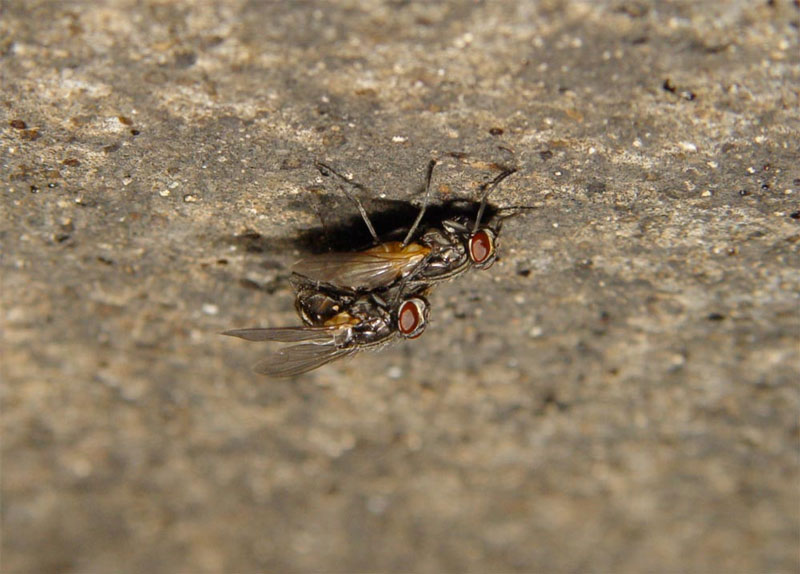Dead because of noise when the rain cloud
If the fly makes too much noise during mating, the bats can detect their location and rush forward.
Flies often waved their wings continuously and strongly when mating. To understand the risk of flies when doing 'that' , Stefan Greif, a scientist from the Max Planck Institute of Ornithology in Germany and colleagues, used a camera to record the motion of 9000 flies at a cattle farm. For more than 4 years, Livescience reported.

A pair of flies are mating
The results show that flies only park or crawl on the ceiling, but rarely fly at night. When cows or beans, the sound they produce has a much lower frequency than the other types of sounds. So bats, an enemy of flies, can't hear the sound of flies if they don't fly.
But when the mating flies, the female spreads her wings, and the male swings her wings repeatedly on her partner's back. The sound that flies make by flapping wings has a frequency large enough for bats to hear. Therefore, of the 26% of mating pairs in the study, more than half lost their lives.
To make sure the sound that flies produce when mating causes bats to detect them, the team attaches dead flies in the same position as when mating on the ceiling. If bats still attack dead flies, it proves that they detect bats by other factors, not by the sound that flies fly when mating. However, the team found that bats never attacked dead flies. When experts played back the sound of the fly's wings when mating, immediately the bat rushed into the speakers.
The Max Planck Institute of theology is one of the few attempts to understand the risk of animal destruction when they mate. The same risk applies to two-legged crustaceans, water insects and many shallow insects.
- Japan has the first artificial rain after 12 years
- The brain has the ability to eliminate noise
- Many diseases from noise that came out
- Why does the rain make us sleepy?
- Noise pollution should not be underestimated
- Why are clouds usually black before rain?
- When will the clouds turn into rain?
- The Dead Sea is about to die
- Noise can make men infertile
- Redemption thanks to artificial rain technology
- Rain by laser
- Discover interesting things about rain
 Why do potatoes have eyes?
Why do potatoes have eyes? 'Tragedy' the world's largest carnivorous life: Death becomes ... public toilet
'Tragedy' the world's largest carnivorous life: Death becomes ... public toilet Tomatoes were once considered 'poisonous' for 200 years
Tomatoes were once considered 'poisonous' for 200 years Detecting microscopic parasites on human face
Detecting microscopic parasites on human face